#Machines of Indeterminate Origin
Explore tagged Tumblr posts
Text
3612: "Bleak Metal"

#Compilation#New Weird Australia#Axxonn#Abtreibung feat Grief No Absolution#Ambrose Chapel#Machines of Indeterminate Origin#Machine Death#Alex White#No Anchor#Anon#Spheres#Dead Boomers#Die on Planes#Undecisive God#Heil Spirits#2011#Australia#Australian#Bandcamp
0 notes
Text
(Another) Ghost in the Machine
DP x Hellblazer (the original John Constantine comic)
Ritchie Simpson continued to search frantically for the connection out of the computer and back to his body as he begged John to explain what he meant by saying “Goodbye.”
Had John disconnected him? He knew John’s sense of humor wasn’t the lightest, especially after Newcastle drove them all a bit insane, but that felt too far even for him. Nah, he’d probably just gotten himself a bit lost in the wave of energy he’d experienced in the Tongues of Fire network and was accidentally looking for his body in the wrong spot.
He pulled himself back and let his mental connection to the digital world expand outward, probing the rest of the machine for the connection. He knew he was in the right system, so as long as he looked thoroughly he’d definitely fi—
Everything flashed a surge of blinding white and then was replaced by pure darkness. He thought he screamed, but he couldn’t hear his own voice. Couldn’t even feel his own thoughts. Trapped in one single instant that stretched for indeterminable eons. Then, eventually (or was it immediately?), awareness began to trickle back.
He was still in the computer, though it felt… different, somehow. His thoughts still weren’t entirely in order. The first possible hints towards his location he found were the sound voices trickling through from the outside world. Voices he didn’t recognize. Young voices.
“I’m happy to help, Tuck, but I’m not really sure what you expect me to do here. You’re way better than me at this computer stuff than me.”
“By all means, feel free to keep complimenting me, but this has been frying my brain, man. I got this thing secondhand, and the system should be quite powerful, but there’s something using up a ton of its processing and I can’t figure out what. I was hoping you could do your ‘enter into the computer’ thing and see if you see anything.”
#okay so for people who don’t know what’s going on with the DC side:#in John Constantine: Hellblazer there’s this old friend of Constantine called Richie who uses “quantum magic” to inteface with computers#and Constantine asks him to find the base of the Resurrection Crusaders (a religious group that’s an antagonist of that part of the comic)#which he does do. but while looking into the Tongues of Fire subgroup he encounters a thing of energy that burns his body to a crisp#but his mind is still in the computer unaware of that#and constantine doesn’t know how to explain that to him so he just… doesn’t.#and unplugs the machine as like a mercy kill ish thing#in the comic he sorta survived in the network for a time longer#but instead this idea was more like he was trapped in the memory banks of the computer#which eventually made its way into Tucker’s hands and led to him and Team Phantom meeting#he’d probably count as a ghost but the situation would certainly be unusual for both sides#dp x dc#dpxdc#dc x dp#dcxdp#danny phantom x dc#danny phantom x dc crossover#dp x hellblazer#dpxdc john constantine#dp x dc prompt#dpxdc prompt#dc x dp prompt#dcxdp prompt#oh also. just gonna kinda sidestep how he helped Constantine out later in the original. I guess John worked something else out this time.#or maybe that event could be delayed so Ritchie can still show up (perhaps with Team Phantom’s aid too though…)
188 notes
·
View notes
Text
Ghoulette Appreciation Week 8
Week 8: Coffee Shop AU & Sickfic
I've been excited for this one! Back to the Midwest Emo Ghouls AU, because they just won't stay outta my head for long!
When Mist doesn't show up to Aurora's coffee shop, she gets worried. Or, Mist and Aurora are hopelessly crushing on each other, but neither seems to realize their feeling are mutual.
Rating: G Content: Fluff, secret crushes, Rory taking care of Mist when she has a cold. Words: 2651
It would be remiss of me to write a Midwest Emo Ghouls Coffee shop AU and not mention @midnight-moth's ficlet (which I think technically they said is only adjacent to this AU? but I wrote this before double checking, oopsie!) with coffee-shop!Aurora and record-store!Mist, the og fic that had me sold on Mistrora! (go read it!)
As with anything I've written for this AU, all credit goes to @herbal-quintessence and friends for its creation, I've picked and chosen my favorite hcs for the ghouls when there are multiple, and for any other inconsistencies with the original creators's hcs and timeline let's just say I'm operating on a different branch at an indeterminant point in time, haha..!
Read below, or on AO3!
The screech of the coffee machine snapped Aurora out of her daydream. She shook her head slightly to dislodge her leftover thoughts, still drifting around about her favourite customer. Aurora kept expecting Mist to walk in the door any second, and she didn’t dare try to meet her eyes while simultaneously imagining herself staring into them under greatly different circumstances.
The door to the shop remained closed however; no tinkling of the bell to herald Mist’s arrival to the coffee shop, and the subsequent arrival of a swarm of butterflies into Aurora’s stomach. For the umpteenth time that day, Aurora squinted out the window to the record store opposite. The lights were still off, the sign still reading closed. Where was she?
Aurora had worked in the coffee shop for several years now. She had applied when she first moved to town as a broke student struggling to pay rent, and had loved every second of it. The coffee shop, it turned out, was the beating heart of this rural town: a social hub for almost all the denizens both ghoul and human. She had taken great delight in getting to know her new community and neighbours, and beginning to recognize people outside of the coffee-scented air of the café.
From her connections at the shop, Aurora had learned about the existence of the dark church, and in particular its close community of ghouls. She had found many of her new friends here, and even her new home. Aurora had got talking with two lunchtime regulars she recognized from the church: one the owner of the hardware store down the street, the other his husband joining him in town for lunch. She had quickly learned that they farmed the fields east of town, and when Aurora had mentioned in passing that she was looking for a place to stay over the summer semester break to keep working, they had offered their spare room. They were looking for a lodger, anyway.
Another regular was Zephyr: church organist, GP surgery receptionist, and one of the first people Aurora connected with in town. They always came in during the afternoon slump, and happily tried the newest and strangest flavours of tea the shop had ordered. Aurora would scribble notes on their thorough yet honest reviews, before they left with an extra-large, extra-strong black coffee for Omega, the surgery’s GP.
It was through Zephyr that Aurora had learned of their lodger Mist, who had recently opened a record store directly opposite the coffee shop. Mist was cool. Seriously, effortlessly, cool. Throughout the weeks that she had started coming to the coffee shop at Zephyr’s suggestion, her visits had become longer more regular. At one point, after Aurora brought over her third drink of the morning, her curiosity had got the better of her, and she had asked Mist if she actually sold any records, seeing as she spent more time in the café than her own shop.
It turned out that Mist had not only been an art student at Aurora’s college several years previously, but had also taken several courses in online business and marketing. She made most of her sales from her website, explaining how her shop kept running with seemingly few customers. Aurora thought she was amazing: smart, arty, stylish, cool... She felt like a schoolgirl with a crush on the homecoming queen. Mountain and Swiss thought this was adorable and frequently teased her about it, reminiscing on their own tentative courtship many years previously.
Mist had started bringing her laptop to the café, sitting by the window to keep half an eye on her own shopfront for customers while being plied with coffees and “free” cakes. She had quickly realized that no café had that good of a loyalty scheme, and that Aurora was instead buying them with her tip money. Secretly, she had started keeping track of what Aurora was spending on her, the notes tucked into the tip jar at the end of each day always covering the pastries, and then some.
As the frequency of Mist’s visits increased, Aurora had become deeply attuned to her presence. Mist was a welcome sight in her window armchair, a source of charming smiles and words which made her heart flutter. And so, on this day in the middle of a cold February week, Aurora had felt Mist’s absence before she consciously noticed it. All day, she had been distracted; one eye on the door or the conspicuously dark record store opposite.
She was so distracted, in fact, that Zephyr had cottoned onto it immediately when they entered for their afternoon break. They caught her eyes flickering to the empty shopfront opposite three separate times while ordering.
“Missing Mist today?” Zephyr asked kindly. Aurora blushed deeply; was it that obvious? “She’s at home sick today, she’s feeling pretty under the weather.”
Aurora’s concern must have shown on her face, and she started pressing herbal teas and cake upon Zephyr to bring to her.
“You could bring them yourself, if you want?” Zephyr smiled warmly: young love was such a precious thing. “She’s not contagious, Omega took a look at her this morning. She just needs some rest and TLC.”
Aurora nodded earnestly, not trying to hide how keen she was.
“You could meet us at the surgery after you close here? I can give you a lift once the Omega sees his last patient.”
“Thank you Zeph, that would be lovey. I’ll meet you there–”
Aurora’s eyes instinctively flickered to the door again as the bell chimed the arrival of a customer. She waved Zephyr and their good-natured smile goodbye, heading back behind the counter.
Before Aurora cashed out and locked up, she also gathered a selection of coffee beans and teas to bring for Omega and Zephyr. She closed the door the minute the clock hit six pm, and resisted the urge to run down the road to the Doctor’s surgery. They were a ten minute walk away at best, and Omega’s last appointment was at quarter-to-seven.
She decided to make a quick detour past the small grocery store. Tea and pastries were fine, but nothing beats the winter lurgy like hot soup. And crackers. Oh, and maybe chocolate, Aurora thought, throwing everything she could think of into her basket. At least with Mist living with a doctor, she would be well taken care of with painkillers and cold medication.
Her bag weighing heavily on her shoulder, she greeted Zephyr as she got to the surgery, perching on a chair in the waiting room while Omega finished seeing his last patient. Her feet swing nervously beneath her.
Aurora sat in the leather backseat of the silver saloon car, as Omega drove back to their house in the suburbs. As they pulled off the road, she saw Mist’s familiar ice-blue bicycle leaned against the side wall of the garage.
“Let me know when you want to go home, I can drive you back.” Zephyr offered, before directing Aurora to Mist’s room at the top of the stairs. She knocked shyly, it was too late to be scared of overstepping now.
“C’m’ in!” a croaky voice called from inside. Aurora gently opened the door, smiling cautiously at Mist and offering a small wave.
“Rory?” Mist’s eyes were rimmed with red, matching the colour of her nose, but they seemed to light up as the smaller ghoulette hovered in the doorway. “What’re you doing here?”
“Oh you poor thing!” Aurora cooed, dodging the question of why Mist’s casual workplace acquaintance was suddenly knocking on her bedroom door. Mist really did look terrible; her face was tired and haggard and her skin even paler than usual. “Can I come in?”
“’F course.” Mist sniffed, hauling herself upright in bed.
“I’ve brought you cake, and tea, and you’re not going to sneak money into my tip jar for once,” Aurora chattered nervously. “Can I run you a bath? Or fluff your pillows? Are you hungry, I brought soup?”
Mist smiled weakly at Aurora’s enthusiasm, a little overwhelmed at the small ghoulette’s whirlwind of fervent hospitality.
“A bath would be nice, this cold’s making me feel disgusting. So would some soup, I haven’t eaten since yesterday night…”
“A bath is is then!” chirped Aurora, “And I’ve got tomato, chicken noodle, or vegetable broth?”
“Tomato, please.” Mist rubbed at her red-raw nose with a tissue. “Zeph could do all this y’know? Or Meg. Did Zephy drag you here?” Conniving scoundrel, Mist thought to herself, anything to win that silly bet with Omega.
“I wanted to.” Aurora shrugged, trying to conceal just how eager she’d been to visit, “Zephyr just drove me.”
Mist struggled to pull herself more upright and swing her feet out of bed, and Aurora made a move to assist her. As she did so, she looked down at the armful of goodies she was still clutching, before whirling around to find somewhere to put them. Mist’s room wasn’t at all how Aurora had imagined: every available surface seemed to be covered in clutter and trinkets, the opposite of the cool, minimalist personality she exuded. The walls were plastered with artwork, lending everything a warm and cosy feeling. Aurora eventually made space on the desk, moving a few mugs – some with pencils in, some with leftover tea – and stacking the assortment of sketchbooks into a rough pile.
While Mist sat on the edge of the bed, waiting for the dizziness in her head to abate, Aurora headed into the en-suite and turned on the taps to warm up and begin to fill the bath. She looked around at the bottles on the windowsill, and poured in some blue bubble bath alongside the stream from the taps. Ocean Breeze, whatever that was meant to smell like.
“Thanks, ‘Ror,” rasped Mist, as she leaned against the doorframe, clean pyjamas in hand, “I can take it from here, unless you want to stay?” The exaggerated wink as she spoke told Aurora that she was only joking, and that despite Aurora secretly longing for more, this was just Mist’s normal flirtatious banter. At least she was feeling well enough for her usual wit to come through.
Aurora closed the door behind her as she left, and hovered in the bedroom until the taps turned off and the splashing sounds of Mist getting into the bathtub safely and without falling had quietened down. She grabbed some of her care package from the stash on the desk and headed back downstairs to make some tea and heat the soup.
Entering the kitchen, she found Zephyr at the table with a mug of the tea she gave them, grinning like a Cheshire cat. Omega paused where he was slicing vegetables and directed her to the kettle and microwave, grabbing a bowl and mug for her too. Aurora hovered awkwardly as she waited for the various liquids to heat, aware of Zephyr’s eyes burning a hole in her back the whole time. Out of the corner of her eye, she even thought she saw them making a gesture at Omega, like rubbing cash between their fingers and thumb. She put the bowl of soup and mug of tea onto a small tray Omega also presented, adding a few napkins and a spoon, before escaping back upstairs.
Balancing the tray in one hand, she knocked on the bedroom door again, entering when she got no response. The gentle sloshing sounds of water told her that Mist was still enjoying her soak, so she set the tray down on the desk and took a seat.
“I’m back!” she gently called at the bathroom door, “Let me know if you need anything else!” Mist hummed in acknowledgement.
Aurora took a look around the room while she waited, admiring the mishmash of colours and styles. Each item so clearly told a story, she wished she could ask about every single one. A small photo on the bookshelf made her smile: a younger Mist, probably round Aurora’s current age, was dressed in dungarees and pulling an uncharacteristically silly face at the camera from her seat atop a hay bale. A handsome dark-haired ghoul she recognised as the previous youth pastor Ifrit leaned against it, while Mountain and Swiss stood to one side, arms loosely around each other’s waists. Aurora couldn’t help the pang of jealousy she felt looking at the picture. Even though she knew they had only ever been friends, she was reminded that Mist had lived a life before she moved here, that there was no way she would ever fall for her young barista with a silly crush.
Abruptly, Aurora stood up and walked to the bed to straighten the duvet and fluff the pillows, perhaps with a little more force than was necessary. As she was tucking the foot of the blankets back in, Mist finally emerged from the bathroom in a cloud of fresh, ocean-scented steam. She looked to have more colour in her cheeks already, the worst of the pallid complexion she had worn before now gone.
“Feel better for that?” asked Aurora, smoothing the duvet with a final flourish, and moving out of Mist’s way.
“Much, thanks Rory,” Mist climbed back into bed, sighing as she sat up against Aurora’s carefully arranged stack of pillows. Once she was settled, Aurora brought over the tray, moving the mug to her bedside table so it didn’t spill. She tried not to stare too intently as Mist ate, smothering the protective fire that burned in her belly at seeing her devour the soup.
Instead, Aurora distracted herself by chattering at Mist about the daily gossip from the street. How Mrs Bloom from the flower shop had come in half an hour earlier than usual, coinciding with Mr Phipps from the jewellery boutique, and did this mean the elderly shopkeepers were finally getting together or not? And the teenager with the purple hair had been back to remove her Missing flyer from the noticeboard, as her pet cat had just been hiding in her neighbour’s garden shed the whole time, much to everyone’s relief.
As Aurora nattered away, she took Mist’s tray back to the desk once when she finished the soup and moved onto the tea, before lying back down under the covers. Aurora continued quietly recounting the day’s events until Mist’s breathing gradually slowed and evened out. Asleep. Aurora silently returned the empty mug to the tray, before grabbing a pencil and a scrap of paper to leave Mist a note in case she woke up wondering where her visitor had gone. She debated for a few seconds, before finally scribbling her mobile number on the bottom of the paper. Given how much time they spent together during the day, it was strange they hadn’t exchanged them yet, right?
She propped the note up on the bedside table and, in a moment of impulsivity, kissed two of her fingers before pressing them into the pillow, feeling Mist’s cool breath curl around them. Aurora shook her head, and grabbed the empty tray to leave before she made any more reckless confessions.
Zephyr drove her home in a comfortable, yet knowing, silence. Aurora felt slightly like she was the punchline to some joke she wasn’t aware of, but tried to think nothing of it. Surely spending your evening taking care of your favourite regular customer who might also be your friend but also might not be wasn’t that weird?
Aurora thanked Zephyr for the lift, choosing to slink off to her room as Swiss immediately invited them inside with promises of a fresh jar of honey from his bees. As she settled down for bed herself, mind still racing over the events of the day, her phone buzzed. Aurora felt her heart skip a beat as she read the message: Hi, it’s Mist. Thanks again for coming today, I’ll have to repay the favour sometime. xx
#ghoulette appreciation weeks 2024#ghoulette appreciation weeks#midwest emo ghouls au#midwest emo ghouls#coffee shop au#sickfic#the band ghost#ghost#nameless ghouls#nameless ghoulettes#ghoulette appreciation#fluff#mist ghoulette#aurora ghoulette#mistrora#mist x aurora#ghost fanfiction#ghost band#ghost bc#em writes
28 notes
·
View notes
Text
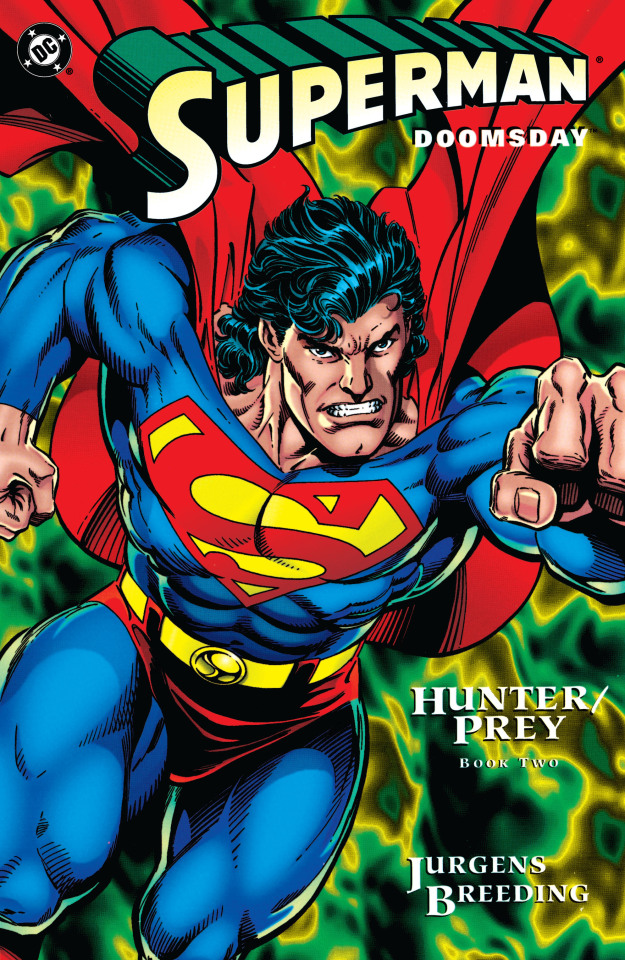
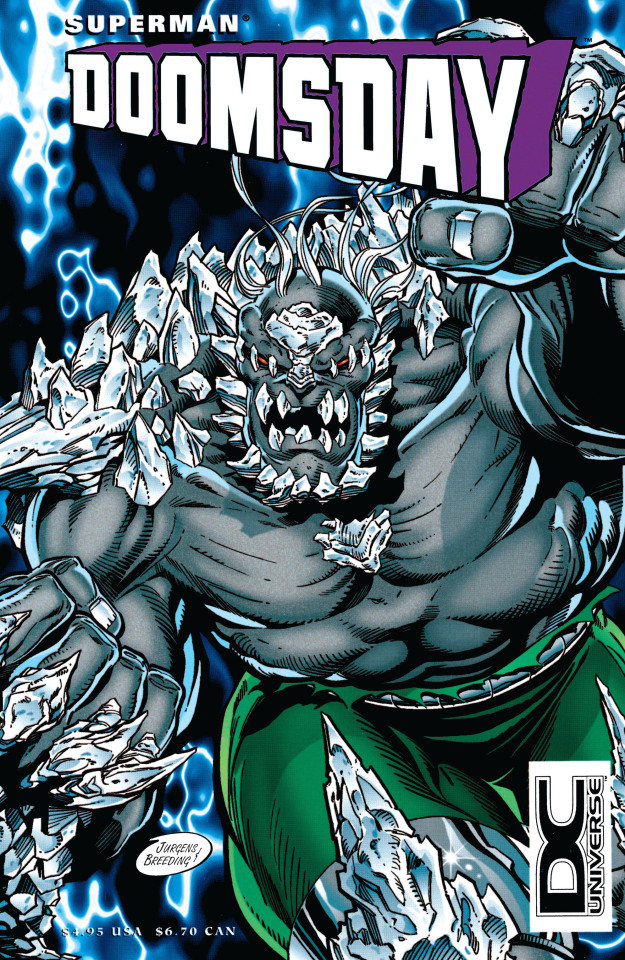
Superman/Doomsday: Hunter/Prey #2 (May 1994)
At last, we find out Doomsday's secret origin! And then kinda wish we didn't, because it's pretty gnarly. In fact, this might be the most disturbing character origin in all of DC Comics, including Vertigo and that "Dark Multiverse" thing they were doing a while back.
But, before getting to Doomsday, Superman has to deal with the mess he left in Apokolips last issue. Thanks to Doomsday's rampage, the Cyborg Superman has taken over the planet and plans to turn it into a new Warworld so he can take it around the universe, conquering other worlds. Yes, he wants to turn the worst planet in existence even worse.
The Cyborg has easily taken care of Darkseid's Parademons by transmitting a frequency that melts their brains. But where's Darkseid himself? He was last seen taking a good beating from Doomsday, and when Superman runs into him, he's... not in great shape.

"DARKSEID IS. TIRED."
Superman is briefly tempted to leave Darkseid to die, but he ends up dragging him to safety and using the Mother Box he borrowed last issue to heal him, because Superman gonna Superman. Just when Superman is lamenting the fact that he doesn't have enough time to go back to Earth for help, Waverider shows up... only to instantly remind Superman that he can't help, due to his sacred vow as a protector of the timestream.
Superman, however, basically tells Waverider to nut up or shut up and use his temporal powers to give him helpful information about Doomsday. Waverider finally succumbs to Superman's bullying and shows him a vision of a "distant planet" circa 250,000 years ago. The planet seems to be uninhabited except for some spiky monsters who kill anything in their sight and a group of scientists inside a reinforced dome. The leader of the scientists is an alien called Bertron who is obsessed with creating "the ultimate form of life" by any means necessary. Including, we soon find out, baby murder.
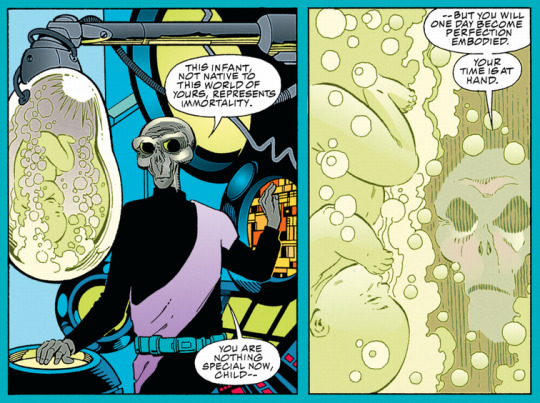
Following Bertron's orders, the scientists launch an alien baby into the hostile atmosphere and just sit by and watch while the spiky monsters tear it apart in seconds. Then, they scare the monsters away with their weapons, send someone out there to scoop up whatever's left of the baby, clone a new infant from that DNA, and repeat the whole process.
After 20 years of doing that every day, the baby has evolved to the point that it now takes minutes to be torn apart instead of seconds. Also, it's now considerably uglier.

Within 30 years, some of the scientists are starting to show reservations about working at the baby murdering factory, but the progress is undeniable. By now, the baby (more like a large bald dude) is able to survive in the hostile environment indefinitely and actually fights back against the spiky monsters... who kill him every time anyway, but still. Progress!
An indeterminate number of decades pass, and the "baby" has turned into a big, hulking creature that Bertron calls "The Ultimate." The minutes of survival have stretched into full years as the Ultimate walks across the planet hunting the spiky monsters until none are left. Bertron is ecstatic that his creation has finally become an unkillable killing machine. So... what now? Well, suffer an ironic death at its hands, of course, because it turns out Doomsday remembers the thousands of deaths Bertron put him through.

According to Waverider's narration, Doomsday might have wiped out all life in that planet if he hadn't stumbled upon Bertron's supply ship. He ended up bouncing through the universe like a murderous ping pong ball, until he reached a planet called Calaton, whose royal family had gained metahuman abilities through the amazing power of inbreeding (that's not a joke about royal families, that's in the comic!).
After years of being unable to stop Doomsday, Calaton's royals gave up their lives to form an energy being called the Radiant, who looks like Silver Surfer but powered by cousin porking (miraculously, he seems to have all his limbs). It took a week of fighting and an explosion that destroyed a fifth of Calaton, but the Radiant finally managed to kill Doomsday. Unfortunately, the Calatonians have a strange custom that says they can't destroy the bodies of planet-killing aliens and must instead dress them up in gimp suits...
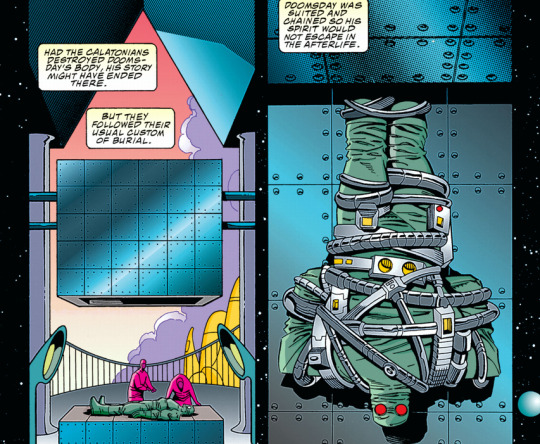
...and launch them into space, which is how Doomsday ended up crashing into Earth in that capsule he finally escaped in Man of Steel #18. This concludes Waverider's presentation.
Back in the present, Darkseid wakes up from his healing nap just in time to recognize that the Cyborg has launched some missiles at Apokolips' food pens to starve the population, because that's what he'd do too. Superman doesn't feel great about teaming up with Darkseid, but he'd feel even worse if innocents died, so he slows down the missiles while Darkseid gets rid of them with his Omega Beams. Darkseid tries to Omega Beam the Cyborg away, too, but he actually survives the blast (that's two people who CAN "withstand the unsurpassed force of the Omega Beams" in as many issues).
Although the Omega Beam hurt him, the Cyborg uses surrounding machinery to repair himself and, while at it, become a giant mecha. Superman hits him with the full force of his heat vision...
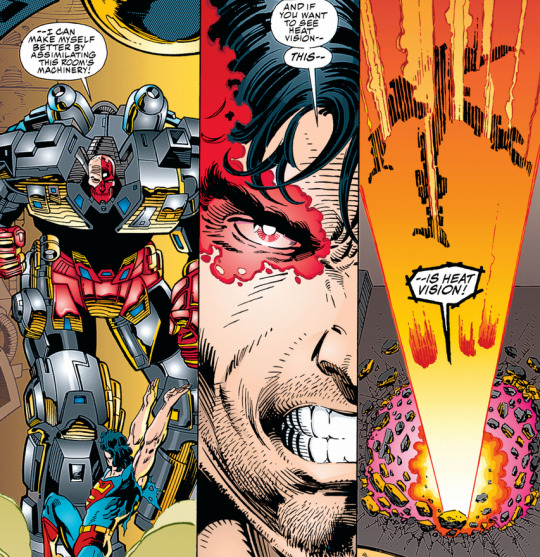
...but once again, eye lasers prove ineffective against the Cyborg, since he just rebuilds himself again, even bigger this time. Darkseid, however, claims he was still recuperating from Doomsday's beating before, but he's in tip-top shape now -- and proves it by hitting Giant Mecha-Cyborg with the REAL strength of the Omega Beams, completely disintegrating him. Sorry for doubting you, eye lasers.
With the Cyborg out of the picture, Darkseid thanks Superman for his help by telling him to get off his planet and go chase Doomsday wherever he is. Deesad reveals where he teleported Doomsday to last issue: Calaton, the planet where they already beat him once, figuring they can just do it again -- but Waverider points out that it's exactly the opposite. Because of Bertron and his gang of baby killers, whenever something kills Doomsday, he evolves to surpass it... which means Superman has no chance against him, either.
Everyone present agrees that Superman is pretty much screwed, but Superman says he doesn't care... while his inner narration shows the opposite. In fact, he's terrified, but he's still going after Doomsday to stop him or re-die trying. TO BE CONCLUDED!
Beard-Watch:
It's coming back! You know a Superman story is getting intense when he hasn't had time to shave in a while.
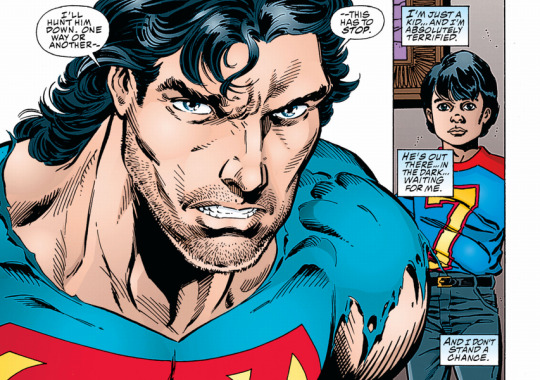
Don Sparrow points out that Superman's "tough guy stubble" seems to come out of nowhere after Waverider's flashback sequence, but I can think of two explanations for that: A) Superman was affected by some minor chronal energy that caused him to age extra fast, at least around the face, or B) that was a long-ass flashback sequence.
Plotline-Watch:
Okay, disregard what I said last time about this miniseries being hard to place in the continuity: Superman explicitly says he's "stronger" and "better" before blasting the Cyborg with his heat vision, so this is definitely happening during the "super-charged powers" storyline. The only hitch is that this is supposed to be taking place during the period when Superman was constantly breaking things and shooting off his heat vision without meaning to, and there's nothing like that here, but that's for the best because 1) that stuff got pretty annoying and 2) minis like this work better if they're not that tied to the ongoing plotlines. No one wants to see five pages of Jimmy Olsen trying to renew his driving license in the middle of a Doomsday fight.
One reason Waverider decides to get off his ass and help out is that he remembers the time he had to watch Superman get beaten to death without doing anything, so he kinda owed it to him. That happened in The Legacy of Superman #1.

There are a couple of references to Armageddon 2001, the 1991 crossover that introduced Waverider: he mentions he was an "activist" before he became a golden being with a flaming head (he even vandalized a statue of Monarch, his original timeline's super-dictator) and when he shows Doomsday's origin to Superman, we see the same psychedelic effect shown in Armageddon whenever he'd touch a superhero to snoop into their future.
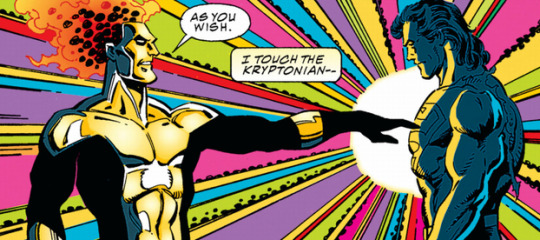
What isn't referenced is the time Superman lived in Apokolips for a while, first as an amnesiac anti-Darkseid revolutionary and then as his mind-controlled "son" (in 1987's Legends crossover), but that's understandable since all those memories were wiped from his mind at the end of that storyline.
Did Darkseid really kill the Cyborg, as Superman seems to think? Nah. We'll find out what really happened soon enough.
Waverider's narration claims that, after Doomsday left that unnamed planet where he was created, the natives found Bertron's lab and became obsessed with genetic experimentation, "sending them down the path of a unique and disastrous future." On that note, Don Sparrow says: "I love the detail on page 27, explaining that had he stayed, Doomsday would have killed the entire planet. It’s like, who cares about some random planet?" Yeah, why are they giving us so much detail about that place?! Weird.
Patreon-Watch:
Our latest Patreon-exclusive article was about Steel Annual #1, an Elseworlds story set during the Civil War that, coincidentally, also features dead kids as a major plot point (Superman writers were in a dark mood in 1994, huh). Read that and more by joining Aaron, Chris “Ace” Hendrix, britneyspearsatemyshorts, Patrick D. Ryall, Bheki Latha, Mark Syp, Ryan Bush, Raphael Fischer, Kit, Sam, Bol, and Gaetano Barreca at https://www.patreon.com/superman86to99!
Also join me in reading more from Don Sparrow, after the jump...
Art-Watch (by @donsparrow):
On one hand, the concept of each of the covers just being a step by step sequence of the two main characters streaking into battle has a certain power and simplicity. But on the other hand, there’s little to differentiate them (particularly these first two) and it can feel a bit repetitive. Another detraction is that the computer generated background on the last issue looked like a wall of flame, but shifting the colour to green just looks like a tie-dye pattern, which doesn’t make sense for the story. Still: Great drawings of both characters.
The first few pages are another good showcase of Jurgens’ unique very tall panel layout, and while it’s mostly exposition (helped a lot by the gradient colour background representing the timestream) there are a few interesting, if odd details about Vanishing Point. First, what the hell is that pediment on the window of Vanishing point? It looks a little like Legion villain Validus, but not perfectly so. Secondly, it’s so eccentric that the time viewer Waverider looks at here is an animated piece of parchment, complete with feather quill pen.

Further along the silhouetted image of an injured Darkseid is very cool. The colouring is a real star throughout, but I particularly like the gold rim lighting on the red metal of the Cyborg’s face.
As we see Doomsday’s origins, it’s interesting to see how Bertron ages. He looks like a malevolent E.T.!

The image revealing Doomsday’s final form is a classic, even if he’s starkers. They also can’t seem to keep his physiognomy straight—if he’s solid mass with no organs, why does he need a belly button? The ink spatters indicating his killing blow of Bertron are a restrained way of showing something gory is happening.
Calaton looks a lot like the fake Krypton from Adventures of Superman #500, though there’s a lot of nice design that went into a fairly short section of the book. It’s funny that a story featuring Hank Henshaw, himself an alternate take on Mister Fantastic, would birth the Radiant, who visually is virtually indistinguishable from The Silver Surfer, who also made his debut in Fantastic Four comics. [Max: Ha! They should have brought Inbred Silver Surfer back for the Superman/Fantastic Four crossover featuring the Cyborg...]
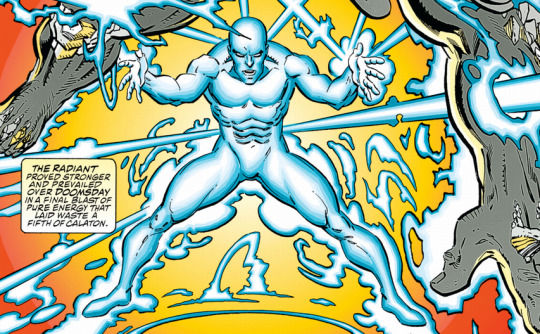
Explaining the containment suit and metallic block where we first find Doomsday is a nice touch.
We talked in a previous review about how Image-comics-inspired the colouring is on this mini-series, but how badass Superman looks throughout is also vaguely reminiscent of Image titles at the time. The cross-hatching and tough guy stubble appearing (quite suddenly—he had none before his Waverider trance!) makes Superman look pretty tough-as-nails. However later in the book as Superman flies off to confront the Cyborg, his face shows so much concentration he begins to look vaguely like Manny Pacquiao—so you know it’s gonna be a good fight!
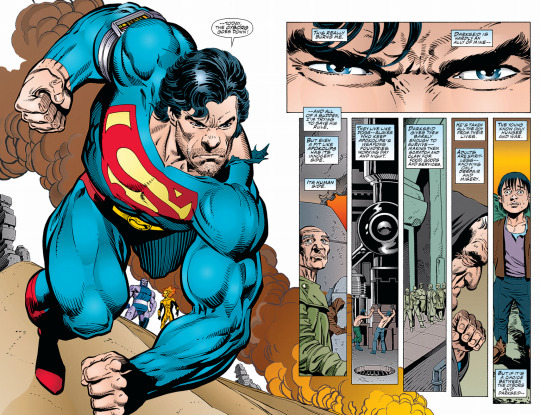
The image of the Cyborg shaking like a ragdoll upon the impact of the Omega beams is a great, electric effect. The single panel the most similar to Image comics must be on page 43 where Superman’s eyes glow red before blasting the Cyborg’s rebuilt body away. While the “eyes glow red because he’s mad” effect is done to death today, when this was published, it was rare enough to be pretty exciting. Darkseid’s march, and dialogue is pretty awesome as he takes care of the threat of the Cyborg Superman. In that way, this is an odd issue—Superman has almost no effect on the outcome. It’s Waverider who fills Superman in on Doomsday’s origins, and it’s Darkseid who destroys the missiles, AND dispatches the Cyborg Superman. I suppose none of that would be possible without Superman’s mercy, helping Darkseid heal, but Superman mostly stands around watching the action in this issue. Lastly, Waverider on page 46 looks a lot like Arnold Schwarzenegger, and it’s fun to think of his thick Austrian accent trying to make its way around all the timestream techno-jargon Waverider spouts. [Max: "Get to da Vanishing Point!"]
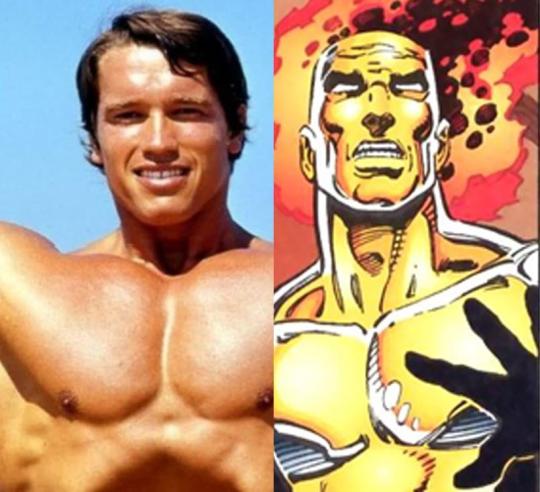
SPEEDING BULLETS:
Wait, did the Cyborg just flat out kill Desaad? I guess not, but it was a cool line. [Max: He's alive by the end of the issue, but wasn't there a story that revealed Darkseid is constantly killing and recreating Deesad? Maybe he did that off-panel.]

Do you agree with Superman’s hectoring Waverider about giving him information from his unique knowledge of the timestream? Superman would have some trouble with the old Prime Directive if he were in Starfleet.
Kinda nuts that the female scientist waited THIRTY YEARS to voice her objection to killing an infant all day every day! There’s a lot of unanswered questions about these scientists. What are they paid? Do they get time off? [Max: I always got the impression that these scientists were aliens too, but this time I noticed Bertron says "this world of yours" to them... So I guess they're meant to be [SPOILERS] Kryptonians, from a habitable part of the planet? Their clothes do match the wardrobe in the early parts of World of Krypton, especially that one lady's earrings. Knowing their race, they probably did it just for the love of science... and launching babies.]
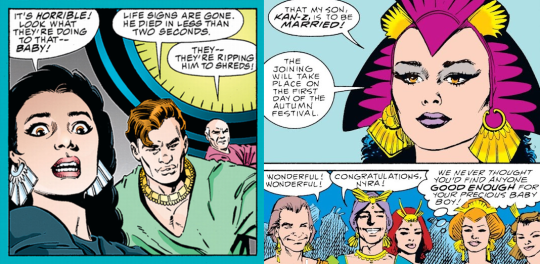
I find myself interested in “the beasts” that Doomsday combats while he’s developing. We’ve never seen them before, or since in any stories set on… that particular planet. [Max: Same here. I like their cartoonish look, too. DC Nation should have done some Roadrunner-type shorts featuring Baby Doomsday escaping the spiky monsters and dying in some wacky new way every week!]
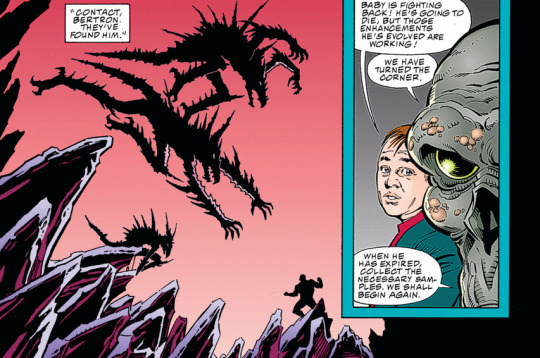
Page 23 they kind of bury the lede, just casually mentioning that if killed, Doomsday revives, evolved past whatever killed it. That’s a pretty insane power level.
Bertron getting murdered by his creation was actually a pretty good metaphor for Krypton’s scientific community—coldly experimenting for science’s sake, with no thought to the consequence they may face in the future. More on that in the next issue.
What kind of food do the food pens hold? Like grain and stuff? [Max: Didn't a Darkseid-themed cereal box show up as a variant cover recently? Yep, found it. It's probably that.]
Everyone--hero and villain--all telling Superman he will for sure lose to Doomsday has to be a knock to his confidence!
#superman#dan jurgens#brett breeding#doomsday#waverider#linear men#apokolips#darkseid#deesad#hank henshaw#krypton#superman/doomsday: hunter/prey#silver surfer but powered by cousin porking#get to da vanishing point
23 notes
·
View notes
Text
Longing Daybreak

TBBAW 2023 Day 1: Hunter
Hunter/Original Character
AO3 Link
Rating: Teen and Up
Word Count: 1,545
Fic Summary:
After Adi Fang falls into a coma, Hunter must sort his feelings as hope for her recovery grows dim.
Tags:
Canon-Typical Violence, Post-Order 66, Coma, Depression, Grief/Mourning, everyone is sad, Little Exposition, Angst with a Happy Ending, Hunter needs a hug

Hunter sat beside a blond mandalorian, currently asleep and hooked up to several medical machines, while AZ tapped away at some settings on the machines. Only AZ’s mechanical sounds and the hum of hyperspace filled the cold silence in the dark medbay. He kept a respectable distance away from the patient, AZ had said something about crowding her, but his eyes never left her. All he could do was watch. So he watched. Watched the subtle rise and fall of pale blue sheets. Watched the twitch of her eyebrow as she slept. Watched her thin lips part slightly from the awkward angle her head rested at.
Despite all this, only one image filled his mind. Or better said, only one scene.
“Adi!” Hunter yelled, desperate to help despite the growing distance between them. As good a fighter she was, assassin droids were another class in hand to hand combat. And she was fighting four of them. He catapulted himself from the immobile train he and the rest of the batch were on to land several cars behind her. Wind blasted against his armor as he sprinted through the gusts to reach the mandalorian. He watched white armor flash between gray droids as Adi fought for her life. As she ran low on energy and weapons, his heart pounded. Beskar clanged loudly. Wind billowed. Over the comms Tech mentioned reaching the Marauder. Then everything went silent. Hunter’s heart, the wind, Tech’s information all drowned out into nothing as the clone watched white and gold beskar fly off the train and tumble rapidly past him.
Hunter shook his head, trying to rid the memory from his mind. She was barely breathing when they finally got to her. The modulator in her helmet sputtered and crackled with each slow breath. It was a sound that haunted him. Once on board the Marauder, AZ was quick to shoo out the others from the medbay. Maybe the droid sensed Hunter’s panic or maybe AZ needed the extra help; but whatever the reason, he was the only one allowed to stay. After her armor was removed, AZ got to work hooking up the pale mandalorian to the various machines in their limited medbay. Hunter remembered the first beep from the heart monitor: Relief flooded his mind at the confirmation of life. Now, he just needed to wait.
Wait and watch. The former sergeant waited an hour. Then two. Then ten. Time both dragged and sped at incredible rates while he sat across from the blond warrior. A full day passed, with him acting as a statue guarding Adi’s bed.
And time just kept going.
He barely ate or slept, staying in the medbay as much as possible the next three weeks. With time came more questions and less answers from the medical droid. AZ tried to appease Hunter, but the droid didn’t have the functions to lie, so more often than not Hunter ended up enraged at the lack of concrete answers AZ provided. The most he knew was Adi had a few broken bones, torn ligaments, and head trauma. Head trauma that left the droid unable to answer Hunter’s biggest question.
“Will she wake up?”
The droid turned slow, hovering as it did just at shoulder height. “The current status of my patient is…” It paused, just a second but a second that screamed to Hunter. “Indeterminate.”
Even with his growing unrest and impatience, Hunter never cracked in front of the others. AZ, at most, saw Hunter’s pulse spike due to the augmentations Tech had given the droid. Only his dreams revealed just how broken the clone was. He’d wake up in a cold sweat, disoriented and panicked, before his eyes adjusted to the dark room and he spotted Adi and her light breaths moving the medical bed’s sheets.
More days turned into more weeks. Staying at Adi’s side night after night wasn’t sustainable anymore. Crosshair was the first to kick his brother out the medbay.
But she was never alone.
If Hunter was out, working a job or getting some much needed planet-side time, someone else took his spot at Adi’s bedside. Omega often hung back on the Marauder when the rest of the batch went on bounty jobs. Because of this, she ended up spending a lot of time with AZ in the medbay: drawing, reading, practicing her Mando’a. Tech could be found there in the late evening’s, reading various holo’s outloud to Adi. Wrecker visited during long hyperspace jumps, telling Adi about whatever adventure the crew had been up to lately. His laughter boomed through the thin walls of the ship. So did his tears. Echo avoided the medbay the most, for clear reasons, though he always stepped in at least once a day to sit for a few minutes in the quiet. Crosshair never spoke to Adi when the other’s were awake, but once the ship quieted down and everyone retired to their bunks, Crosshair slipped into the infirmary and talked about the same things they’d discussed before. Before her endless sleep.
One night Hunter woke up to the sounds of repressed crying, a noise he’d gotten used to hearing around the ship. But not from Crosshair, and certainly not pleas for the mandalorian warrior to hurry and wake up. That cold night in hyperspace, in the dim light of the medbay, Hunter held his weeping brother until he fell asleep.
Adi stayed asleep.
AZ reported the physical injuries she sustained had fully healed. Without better equipment, however, the droid could not ascertain the condition of her mind.
That was the last update Hunter needed to justify their next mission. The former sergeant contacted an old friend, hopeful for a solution or a lead on one. Rex sat, the blue hologram floating in the confines of the cockpit, rubbing his chin as he considered Hunter’s request. Quality medical equipment wasn’t easy to come by, and certainly not for clones and their associates, but he did have one idea.
“Alderaan. They’ve got the tech and we’ve got a contact that can get you to it, but it’s Imperial controlled space.”
“We’ll do it.” Hunter knew what was waiting for them if they were caught, and yet he had to try. Had to try something.
Rex nodded his head affirmative, catching a glint in Hunter’s eyes the old clone was all too well acquainted with.
What followed was a series of instructions, code words, and waiting. More waiting. After such a long wait already, Hunter thought this final hour would be easy. But instead, he found himself pacing the length of the cockpit, checking the time only to learn a minute had passed. It drove him a kind of mad he thought he’d already become.
Rex sent the message.
Hunter didn’t sit down as the Marauder made the tiny jump from their waiting spot to Alderaan’s orbit. They flew through an imperial checkpoint with ease and headed to the coordinates Rex had given them. They landed just outside a small village, near what looked like a farmstead with a few barns and cattle grazing about.
Landing, greeting a stranger with a code word, and then moving Adi from the Marauder's tiny medbay to one of those barns was a whirlwind. All Hunter knew now was that he was pacing and waiting. Again. The doctor had to look Adi over, run some tests, she had said. Though everyone was informed that the village was safe to wander, no one strayed far from the barn.
They had waited so long already. What was another forty minutes?
Forty minutes turned into four days.
To pass the time, Clone Force 99 helped around the farm. It was then, on an especially hot day that left Hunter shirtless, with the clones dotting the fields picking produce the machinery had missed, that they heard the farmer’s wife-the doctor who had been attempting to treat Adi, ran out of the barn and yelled with all her breath for the clones.
Hunter sprinted. He ran from the fields to the barn, heart pounding so loud it was all his ears could pick up. It was a dream right? The sun’s brutal heat and specks of dirt caught under his nails, that wasn’t real. After so long. How could it be real? Hunter kept willing to wake up, kept willing for the dream to cruelly end just before he could reach the barn doors.
He never woke up.
Cool air greeted him as he passed through the threshold of the large building. All of his speed left him as he rounded the corner of the animal pens to the makeshift infirmary, divided only by white translucent sheets. Through them, he made out a figure sitting upright in their cot.
Every step forward Hunter begged a Maker he’d never given much thought to keep him moving. Sensation drained from his limbs, but that curtain drew ever closer. Then he pushed the white sheet back.
“Hunter.”
Her voice was warm, if a bit coarse.
Every bit of self control, ounce of sensibility and self-respect as a calm and collected leader to his family left him instantly. Hunter threw himself forward, wrapping his arms around Adi and buried his head in the crook of her neck.
“I almost lost you.”

Dividers by djarrex
@tbb-appreciation-week
12 notes
·
View notes
Note
#Justice4Sweeper
Contemplating whether I should rant about droids’ rights and risk getting cancelled—okay I don’t care let’s gooo cancel me baby. It’s my college experience all over again!
So. I don’t believe in droids’ rights because I think the concept of “rights” applies to organic beings (with another split between organic sentient beings, aka “persons,” and organic non-sentient beings, aka “animals”—but for the sake of this argument I’m using the word “organic” to talk about persons here, so you can put your “but banthas are organic so why don’t you give them rights” strawman away).
Somehow, we sentients wound up in this galaxy—whether through some lucky cosmic accident and subsequent evolution or being born through the Force or whatever—who cares, somehow we got here, and we are what we call “alive.” That mysterious aliveness is unique to organic beings. We live, we die, we breathe, we reproduce, our cells replicate and regenerate—we’re alive. Nobody has to assemble us or program us. Two gamete cells come together (in most species, anyway) and automatically a new being begins to form according to the laws of nature.
Droids are not alive. We created them. True, we created them to mimic aliveness, we gave them the ability to use language in a way that mimics ours, we even gave them a capacity for data storage that we interpret as “memory” and programmed them to display certain behaviors that we interpret as “personalities.” But a droid does not come into existence without someone else manufacturing it and programming it and putting it together. It does not possess the aliveness that organic beings have by nature. Droids mimic life, but they do not possess it, and therefore they are inherently different from us and not entitled to the natural rights that organic sentients have.
Okay. So that’s my stance on droids’ rights. Now, when I tell people that, they assume I must, like, super hate droids and go around kicking every droid I see. No. Nooo. I may have a special hatred in my heart for Sweeper, but that’s just because he’s utterly incompetent. I go to a cafe and the waitress is a droid? Cool. I’m not going to leave her a tip, because droids don’t need money, but I’ll smile at her and say please and thank you, ‘cause my mama raised me right. When I visit home and see my mom’s protocol droid See-Threepio, I say hi and ask him how he’s doing and tease him and yeah, interact with him as if he’s a person. (I know some of the based red-pilled types will go so far as to refuse to use gendered pronouns for droids, but I do call droids “he” or “she.” I just do so without actually believing they’re people, like how we call spaceships “she” and stuff).
I’m nice to droids. Most of ‘em, anyway. I’m willing to suspend reality and entertain the fantasy that these machines, that we created to mimic us, think and feel like we do. But at the end of the day, I know that Threepio’s “personhood” is just a projection of my mind and my own sentient experience, not something innate to him.
Take Ren the Bantha of Indeterminate Gender or Origin for example. The stuffed bantha that Luke gave me for my sixteenth birthday. I love Ren. I used to talk to Ren. I used to imagine Ren talking back to me. I dressed Ren up and brought Ren everywhere and wrote fanfiction about me and Ren having adventures. I projected life and personhood onto my stuffed animal, but no one in their right mind would seriously argue that a stuffed animal has rights. It’s the same thing with droids—the only difference is that while I’m the only one pretending my stuffed animal is alive, we intentionally programmed droids to contribute toward their own illusion of life.
Despite not believing in droids’ rights, I do actually think droid abuse is bad. Being cruel to droids for the fun of cruelty is messed up. Not because droids are people, but because the love of cruelty is evil. And I think “abuse” is an accurate term that doesn’t necessarily denote personhood—like how we talk about abuse of power, etc. Droid abuse is kind of a separate conversation though, even though people like to conflate the two.
Anyway—I think one thing that pisses me off the most about the droids’ rights issue is that people take it and run with it in ways that don’t make sense. Like…okay, I may not agree that protocol droids or other advanced processing droids are sentients, but I can see why you would feel that way and how you might come to that conclusion, especially when it comes to droids that haven’t had their databanks routinely wiped. I don’t think it’s insane to believe in advanced droid sentience—it’s incorrect, but not insane.
But…mouse droids? Gonk droids? Repair droids? Sweeper? My guy…my brother in the Force…no. That’s not a person. That’s a glorified toaster on wheels.
5 notes
·
View notes
Text
Sandwell District — Where Next? (The Point of Departure Recording Co.)

youtube
It should have been a question. The transcontinental collective known as Sandwell District had been defunct and assumed shuttered for years, its fax machine disconnected, its Situationist International Tumblr since overtaken, when the sudden, unexpected announcement in early 2023 of a reissue effort for 2010’s celebrated Feed-Forward revived interest among the techno faithful. Its key members had been operating independently for long enough that the prospect of a return was sufficiently dim, yet here was proof of life — that the mark of anonymous, forward-thinking dance music from these corners hadn’t yet been buried. Half a year on from the reissue, another curious missive in the form of a compilation and the announcement of a Primavera Sound gig. Something was afoot. “Where next?” should’ve been appended directly with “Why now?”
Instead, it’s an elegy.
Juan Mendez (aka Silent Servant) died alongside fellow Los Angeles artist Luis Vasquez (The Soft Moon) and Mendez’s partner Simone Ling January 18th at the age of 46. Every review of Where Next? you read will address this, so it’s not necessary to belabor its circumstances or the outpouring of grief in its wake, but suffice to say that Mendez was beloved in L.A. and beyond for his work both as a producer — which he was still a master of, as his (ill-)fittingly titled In Memoriam EP out in November on Tresor confirms — and, crucially to Sandwell, its visual language. One of the key components of Sandwell District was its resolute anonymity; for years, if you were buying music off these guys, it was white label 12s with no identification save a stamp of the name and a fax number. Mendez was the one who gave the group that Situationist-inspired aesthetic, lent depth and a difficult but still discernible additional dimension that otherwise may not have been there. In retrospect, it feels like no accident that the zine, the music and the “moment” all collided at the same time; four protagonists with years of experience behind them peaking in simpatico is an exceedingly rare thing in the dance world, and to have it happen as it did was both carefully orchestrated and worth all the praise. Dusted was no exception.
Without Mendez, Sandwell District’s revival now feels precarious, uncomfortable, indeterminate. The remaining core members — Karl O’Connor (aka Regis), Dave Sumner (Function) and Peter Sutton (Female) — must return to and reassess the question of this very compilation, whose existence initially struck me as a cynical money grab but, more charitably and with more consideration, could also have been intended as a siren for something new en route, a way of reminding those who were there and a slap in the face to those who weren’t that this group wasn’t just your run-of-the-mill Tuesday night Berghain residents, this was something else.
And what was that? Take a listen: From 2002 to 2012, a dozen tracks assembled for this comp mine Sandwell District (the label) for a retrospective that graphically displays the production talent at work while still leaving something on the table. The credits here all say “Sandwell District &,” but it’s superfluous; regardless of liner notes, however, the music holds up and you know what you’re getting right from the off with Function’s “Reykjavik,” originally from 2007’s “Isolation” 12”. A wobbling, heavy low end and the lightest touch of hi-hat establish the pulse, with a twinkling alien transmission straight from a 1950s sci-fi movie offering counterweight. It’s the crashing handclap and subsequent, seemingly endless decay at 30 seconds that really wakes you up, though — like the uneasy ambiance, a familiar trope of the group’s oeuvre but one forever deployed with the deftest of touches.
“Reykjavik” is one of the two earliest songs from this compilation; the other, CH-Signal Laboratories (8003 Lucerne)’s “Hypnotica Scale (Original Mix),” preceded it in ‘07 and was originally titled simply as “Scale 1 (Original Mix).” It’s a rolling IDM number that feels more primitive, less cognizant than the productions that would follow in its use of space in your headphones. It’s also arguably the thinnest track here from one of the few names in Sandwell’s history that was never fully declassified but to my ears sounds like Sumner’s work.
As the most prominent faces of the collective (Mendez was reticent and Sutton all but invisible at the group’s peak), O’Connor and Sumner often seemed to be the ones with the heaviest hands in final output, too — consider Sumner did the final Fabric mixdown, for instance. The balance gets partly redressed here: O’Connor gets credit for two songs and two edits; Sumner gets five songs (six if you count CH-Signal); Mendez gets four; and Sutton gets a song and a remix under the Kalon alias, which he shared alongside Karl Meier, a fellow member of O’Connor’s Birmingham-based Downwards posse. It works to great effect; if you hadn’t known this was a compilation spanning half a decade and not a cohesive album from a single set of sessions, nothing gives it away. Both sequencing and pace are thoughtfully examined as the album obliterates your speakers at the proper volume and eventually rolls into the station after some 70 minutes with the only song that really lets you up for air, “Inter.”
Still, questions remain. Timing aside, foremost among them is why this comp starts with tracks from 2007 and not 2002; that’s scything half of the label’s existence out of the picture, and it’s not like “Untergang” or “Cally 2” are much the worse for wear at this remove. More pointedly, why are any singles missing at all? A double or triple LP either mixed to its constituents’ satisfaction or arranged chronologically would’ve been equally potent.
Another question: Wherefore art thou, Rrose? Like Meier, Yves de May and Bob Ostertag, Seth Horvitz existed on the outskirts of the District, only entering the frame in Feed-Forward’s wake — but it feels grossly unjust to neglect Rrose’s contributions in particular as the label wound down and its members moved on. What I said at the time of “Merchant of Salt” stands: Sandwell’s methods were perhaps best executed by an outsider who subsequently struck out into more experimental lands, extending the spirit of the collective’s reach beyond the vision of its original members; in a way, Rrose alone best answered the question posed by this compilation, which only makes their absence more conspicuous.
As with everything else swirling about Sandwell District, explanations will trickle out as glyphs or remain scant, incomplete, perhaps even contradictory. Maybe we won’t know for weeks or months; maybe we will never know. This is all part and parcel of the operation, which remains fun for the sake of intrigue but as listeners can only really leave us to trust our ears and hearts. Scrape away the calcified grayscale complexion, then, and you have what lies beyond the questions — you have the real answer, the one that matters most. Did I say elegy? Sorry, I meant panegyric. Long may it be heard.
Patrick Masterson
#sandwell district#where next? the point of departure recording co.#patrick masterson#albumreview#dusted magazine#silent servant#downwards#techno#regis#female#function#house#dub
2 notes
·
View notes
Text
Another, more subtle justification for the Butlerian Jihad is also found in Frank Herbert's original novels, specifically Heidegger's thesis that the use of technology trains humans to think like machines. The problem is that machines are deterministic; thus, training people to be machines is self-limiting. Herbert seemed to think that to be human is to be essentially 'open-ended', capable of undiscovered, indeterminate evolution, both personally and as a species.
2 notes
·
View notes
Text
On December 12th, 2012, an box of indeterminate age was found in the storage room of the Miracle Theatre in Paradise, New Hawaii, marked only “PART II”. The contents of the box were as follows:
- A reel of film containing the Silent-Era short, Introduction to the Snow.
- A scrap of notebook paper on which was written what appeared to be a love poem, entitled “Isle Unto Thyself”, and credited to a Simon Minor.
- A painting depicting conjoined rainbows crossing the sky. Each rainbow casts a black shadow beneath it, and the clouds are parted to reveal the sun, drawn as a stellated octahedron. The painting is signed S.O., and labeled as Black Rainbows.
- An invitation to the Marble Society’s White Ball. The Marble Society was created to celebrate and provide funding to those gifted in the arts, although it primarily favors artists who already come from some level of wealth or status. The White Ball is an annual event to which the Society invites artists who show promise to assess their worthiness of its assistance.
- An intricate wood carving of a young man and woman in a forest clearing with details of plants and animals on the side borders, as well as a strange face on the top border and, upon closer examination, a shadowed figure hidden in the trees. The piece was identified as “Murders”, carved in 1949 by artist E. K. Steinway.
- A poster for the film 宇宙ステーションのレベル7. (Translated title: Space Station Level Seven). Though filmed in France, where most of the personnel originated from, all dialogue and writing in the film is in Japanese, save for one dream sequence.
- A copy of “The Mind Electric”, a scientific article by Dr. Robert Caligula discussing psychology, psychiatry, neuroscience, behavioral conditioning, and the ways in which they can intersect, including speculation on possible psychiatric treatments building off of electroconvulsive therapy. The paper is covered in scrawled drawings (lightning bolts, crosses and crowns are recurring symbols), and appears to be somewhat burnt around the edges.
- A photograph of a gray wall on which a maze design and the word “LABYRINTH” has been haphazardly painted.
- Blueprints for a “Time Machine”. Upon closer examination, the blueprints contain very little in the way of actual instruction, and what is there is less scientific and more so philosophical rumination on freedom, regaining lost time and having a mastery over one’s own experiences.
- Sheet music, seemingly water-damaged, for a song titled “Stranded Lullaby”. No author is credited.
- The program for the musical Dream Sweet in Sea Major. The show was only ever performed twice, with little-to-no publicity.
- Found later tucked away was a clipping from the newspaper The Castle with the headline “Variations on a Cloud” and a photograph of the Apollo Infirmary burning down.
Despite the writing on the box, none of the contents alluded to or even implied the existence of a Part I.
Case is on indefinite hold.
#roll the bones#bones’ writing#hawaii part ii#miracle musical#tally hall#tw electroconvulsive therapy#tw electroshock therapy#tw unreality#tw murder mention#tw fire#ask to tag
396 notes
·
View notes
Text
Ritual Resets
with thanks to @rainboq for helping me come up with this idea
Humanology was a new field, the arrival of terre-originating life to the Llys Don Reach only dating to around twelve kiloperiods ago, after all, and the Elect of Parabuteo were not even sure the field was valid. They had spread so fast, and talked about themselves non-spot, so why would an alien, to them, biont ever want to study the new arrivals? Even the name humanology was in debate, terre being far, far less constrained a concept than human.
Kaf had set out to prove them wrong through potentially the worst possible way. It was widely acknowledged that terre history could not be backtracked any further than their arrival. They evolved on a planet called Earth, and then, at some point, for reasons unknown, they had left, in vast, subluminal barques, not having discovered the secrets of tei al-ardh. And some indeterminate period of time later they arrived in this reach, from their own. To try to find out any more was foolish, when even details during their first kiloperiod in the reach had been forgotten, such as on which world they first landed.
It was to one of these purported first worlds that Kaf traveled, on grant, along with her pack, eight strong, small, but supportive. Bept was unremarkable, orbiting its sun on the edge of terre-habitable proximity, and so had never achieved much population growth or influence. But, in orbit, it still had one of the old inter-reach barques, as a museum piece. The terre allowed Kaf to study it, although clearly not expecting anything they had not discovered during the long time it had orbited their world. “We know the physical properties of Earth, yes?” Kaf said, in frustration. “It’s size, day, year?”
“Yes,” the terre researcher, named Yao, said, maybe sadly, although it was hard to tell with aliens. “Everything but it’s location in the universe.” “But this is impossible,” Kaf protested, “I can see the a-machine in this barque? It is still counting the time. Why could you not simply plot a reverse vector and then extrapolate based on time in transit?” “Earth,” the researcher said, “seems to have had some sort of cultural preoccupation with resets. Jubilee years. The Long Count, which was in use at least a hundred years prior to launch. The burned house horizon. This tendency extends into the computers of this barque. Around every one hundred and thirty-eight terre-years its count resets. We can only guess the makers, from so long ago, had some sort of religious, or ceremonial purpose behind it.”
Kaf sighed, defeated for now, although ⸘ would try again, hedgewise, as Freetravelers said in their peregrine patois. For now, ⸘ looked at the label, in a language long lost, but, helpfully translated, next to the counter ticking upwards.
“UTC,” the label said, and then, helpfully added, “(Unix Time).”
25 notes
·
View notes
Text
Queen live at Mount Smart Stadium in Auckland, New Zealand - April 13, 1985

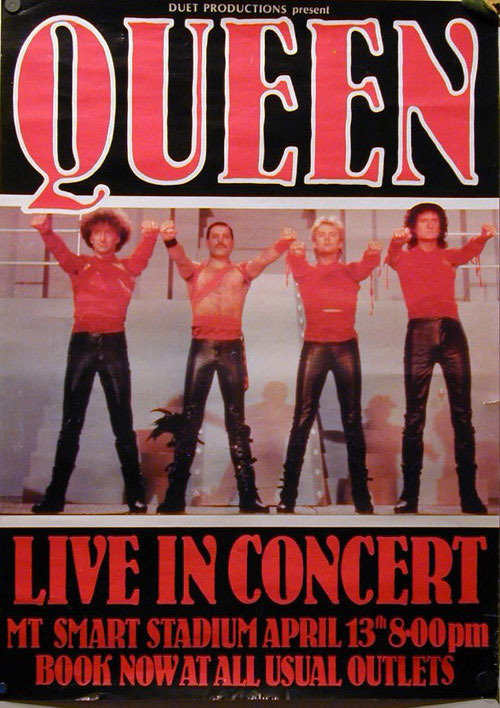

(x)

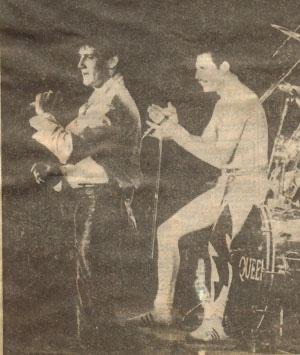
This outdoor show was Queen's first and only concert in New Zealand. According to an early tour itinerary, two other shows were originally planned (on April 11 at Hawks Bay in Tamoana, and on April 14 at Queen Elizabeth II Park in Christchurch), but this show in Auckland didn't even sell out, which is likely the reason why the band did only a single show in the country. It was initially scheduled to be played at Western Springs Stadium.
Queen were a half hour late going on. After soundcheck Freddie Mercury got very drunk with Tony Hadley of Spandau Ballet, sharing entire bottles of vodka and vintage port. Hadley was around only because his band's New Zealand tour dates had been suddenly cancelled while playing in Australia, and later in the evening he would clearly ignore his manager's warning to keep a low profile.
In 2011, Brian May and Roger Taylor recalled the evening in the extras of the Days Of Our Lives documentary. Their intro music (an arrangement of Machines, off The Works album) was already playing and a few people in the backstage area were frantically helping Freddie get into his tights. "You stupid cunts, you've put my tights on back to front!" cried Freddie part way through the proceedings. With the clock ticking, the laces of his boots were untied and his boots came off and the tights were properly put on. Freddie made it to the stage with literally seconds to spare.
After the second song, he shouted, "Hello, New Zealand! We're gonna have one motherfucker of a time!" Both Brian and Roger recall Freddie when started Somebody To Love and forgot what song he was playing. In 2011, Roger added, "The first half hour of the gig was terrifying for the three of us because we were playing like trojans to make up for Freddie's deficiencies." Spike Edney also recalled that Freddie was "ad-libbing, making things up, singing crap" for the first half hour.
Between songs (probably after the medley of old songs), Freddie did his usual falsetto vocal improv and added, "My voice is fucked!" According to a book on Queen, at one point he proclaimed to Hadley who was side stage (into his mic and thus audible to the audience) that he was "pissed."
Before doing Love Of My Life, Brian explained how over the years it had become a tradition for the crowd to join in. However, the song wasn't well known in New Zealand, and even if it were, the locals weren't the public singing type.
Most of the above pictures were taken by Mike Tucker and David Austin, the last of which was taken during Hammer To Fall, which Freddie introduced as, "One for all you heavy metal fans to have a good jerk-off to."
Tony Hadley joined Queen for Jailhouse Rock (as seen in the second picture above). Roger Taylor recalled Tony didn't remember a single word of the song. He apparently ended up singing Tutti Frutti instead. He fondly recalled the day in a 2006 interview. Here's a pro pic taken during this song.

Here are two posters for the show, the second of which indicates the show wasn't yet sold out on the day of:
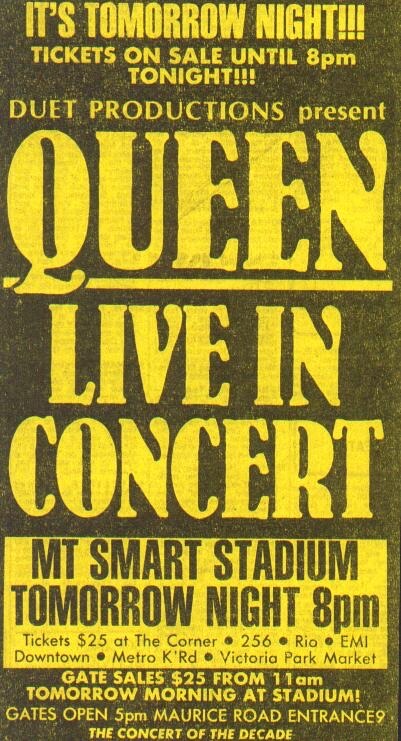
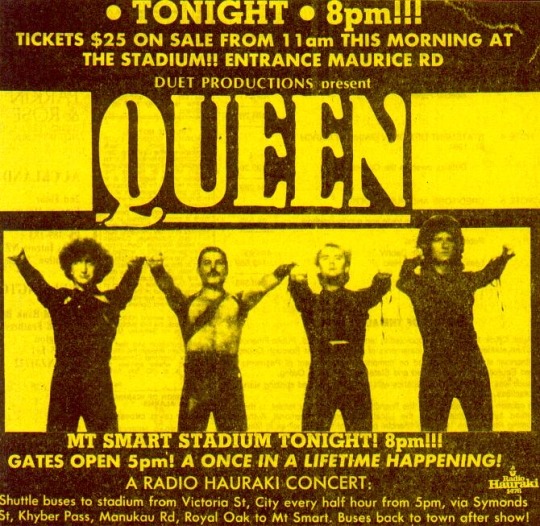
A video (of indeterminate length) of this show reportedly exists in the archives of a local TV station, but nothing has ever come of the rumours.
The day before the show, the band did an interview for TV.
Fan Stories
“By April in NZ you're well into Autumn, maybe a bit late for an outdoor concert but luckily April 13 was overcast all day without raining. And so it was on this day that Queen played their first and only concert in little ol' NZ to a crowd of 30,000 at Mt. Smart (now Ericsson) stadium. The concert was late starting, Freddie Mercury and Tony Hadley (from Spandau Ballet) got blind drunk before the concert. Few people seemed to notice, although there were a couple of Maori guys in front of me who were laughing like hell when Freddie came on ("Aw man, he is so out of it!!"). Freddie didn't seem to be sparing the four letter words ("Hello New Zealand,we're gonna have one muthaf*****er of a time"). In between songs,Freddie would do his customary vocal excercises, mostly built around the opening notes of "You take my breath away", then dimiss it ("My voice is F*****D!!"). Then later when introducing "Hammer to fall", ("Here's one for all you heavy metal fans to have a good jerk-off to!!"). I heard an interview earlier in the week with the promoter claiming that Queen's set would please both old and new fans. In spite of this I doubted how deep into the back catalogue Queen would go. Imagine my surprise when they dug up a gem from the first album like "Liar". With all the changes in Queen's sound and image in previous years, this song eliminated any doubts I had that this band was in touch with its past. This was one of the last songs I had expected to hear and without a doubt my highlight. For "Love of my life", Brian May explained how over the years it had become a tradition for the crowd to join in. Unfortunately, this song is not as well known here as it is in other parts of the world and besides, NZers are reluctant public singers at the best of times anyway. Freddie's infamous drag act during "I want to break free" was back after it had been unceremoniously ditched earlier that year in Rio. At the end of the song he threw his falsies into the crowd. Tony Hadley joined Queen on stage later on. Spandau Ballet were touring Australia at the time and flew across the Tasman to see Queen. He joined the band for "Jailhouse Rock", I've since heard that he was so drunk that he started singing the first verse to "Tutti-Fruitti" instead (never noticed). The reviews were pretty fair. There were words to the effect that Queen delivered, although it took awhile. Maybe some songs were a mystery to those who had only heard "Greatest Hits", but things really took off in the final third of the show. Almost everybody seemed to be singing along with "Crazy little thing called love", doing the handclap in "Radio Ga-Ga" and swaying to "We are the champions". Roger threw his drumsticks into the crowd at the end of the concert, one has since surfaced. In spite of Freddie's claim to the contary, his voice sounded just fine and no doubt everybody left happy. I, for one, couldn't have asked for more.” - David Austin
(x)
41 notes
·
View notes
Note
I don’t know why I’m messaging you. I guess I’m hoping that if I can spread my story I might be able to stop thinking about it so much.
I wasn’t originally there. It’s hard to think about before, but that’s not important. I blinked, and then I was in a domain of the End. It looked like a retirement home, same as the one I used to visit my ama in. Just me and thirty or so other people of varying ages. And the avatar, I suppose. Our avatar was this ancient looking man, who would go up to one of the people waiting in those motorized chairs and touch their face. As he did, his body became younger, wrinkles disappearing and back straightening, and the person he touched would wither into an old, tired looking body.
It wouldn’t last though, as we sat in our motorized chairs and watched, the avatar would begin to wrinkle and age once again, and the person, attached to monitors and machines, would flatline right there in the room. And then, orderlies would wheel them out and bring someone new in to take their place.
It’s the last person to die before me that I can’t stop thinking about, though. I don’t know their name or their gender, but they had short black hair and wearing a bright green Hawaiian shirt, like they had been on vacation before ending up here. It was the brightest thing in the room. They had sat next to me for the indeterminable time it took for the man to work through all the other people in the room, but we never spoke or looked each other in the eye. Nobody spoke in that domain. It took a long time for that person to die. If anyone recognizes that description... I’m sorry. I hope it brings you closure to know.
It was as they were wheeling them out that the world returned to how it was before. The avatar had just begun to approach me, and I had already started to feel the effects of his life-stealing powers when it stopped. I’m not sure how old I am now, and it terrifies me to know that I’ve had however many years stolen permanently from me. As for that avatar, well it seemed like he really needed us to sustain him, and he collapsed dead on the floor in front of me seconds after the return, turning rotten as if he’d already been dead for years. Good riddance.
Christ. I’m so sorry. I’m sorry for the other person with the green hair and their family too. I always thought the End wouldn’t have a domain cause like they get everything in the end ya know?
But damn that’s rough.
24 notes
·
View notes
Quote
In seeking the keys of consciousness, of animation and awareness, one can never have the correct approach. The lens is always too exclusive, the instruments focus blindly and leave out the world in which they exist. Seekers mine to their idea of the center of the world, but a center is a naive a concept as a fathomable whole. Like the wolf who in licking flesh off the blade cuts it’s tongue and devours itself to death, the plagued mind of the Scientist rips apart the world in front of him looking for the proof of his superiority of his chosen-ness and stands in heaps of flesh and fire with only the curse of indifference. In the shade of steel monoliths, an inverted sublime, in terror of our own power, the myths of Lucifer and Bacchus lose their initial revisionary lights and evil and delight are taxed and dreary. The heroic have long been cast out as nuisance, for in their sobriety they know they are now the Un-makers, the disruption of mass unmaking, and for that they would suffer unimaginably. Outside of these myths, in the horizontal light of a rotating Earth, a magic still dances. The play of light on nothing-something for no one, and there life is but for no reason. There are no omens in the moon and wind, just light and displacement. With the arrogance of language we seek to live only within it and not of the world it represents. Nature was perceived as frightening and hostile, so it was fashioned into a nemesis. Now as it runs off with itself still independent of our will, thriving and careless, yet different, always different. Like a sound too loud and distant, and ricocheted across all valleys, so both its origin and texture are indeterminable. A solar flare trumpets the cornucopia. We hold our bitterness like flowers at gods grave. The Earth will pay for not loving me. If I can’t have her no one will. Scorned and jealous of every moment we can’t preserve of every love not endless. Life lived only for itself is an unbearable torture to the vain. The dreamers of Heaven or Elysium wander, locked out by their own failures to keep the dream alive. For god is but one dream to have died: the dream of objective approval, of validation of our thoughts and feelings and ways of life. But not all dreams have yet been exhausted and vexed. Our shadow dances on the horizon as the dawn silhouettes us toward the mountainside. A mere body, caster and perceiver of shadow in one—a Plato’s Cave-Machine— living the dream.
Val Storm - In Thine Image: The Gnosis and Narcissism of High-Tech Escapism (Black Seed #6)
11 notes
·
View notes
Note
Inventory Check
Brush: A brush, though not a regular one for hair. It was a handbrush, with a carved and polished wooden handle and organic bristles of indeterminate origin (it was horse hair). It had a plain leather strap going over the back to help secure it in one's hand. It was the sort of brush one might use on a machine, shoes, or perhaps a horse itself. But looking at it, it appeared to have never been used before, the bristles absolutely immaculate.
1 note
·
View note
Photo

THE THREAT OF CONTAGION - Massimo De Carolis
Published on the Quodlibet website, March 12, 2020. Translated by Ill Will Editions.
***
Now that the media storm over the Coronavirus is beginning to calm down, allowing at least some reasonably certain data to emerge, and whilst the entire national territory is subjected to a regime of exception never before experienced, we may perhaps venture some remarks on the interweaving of the biological and political in the current emergency, without fear of mixing the two levels and thus contributing to the general confusion.
The first data that does not seem to be controversial is the exponential rate of increase of hospitalizations and deaths, which are doubling every two or three days. The epidemic contagion is not an illusion but a real fact, which could saturate the capacity of our hospital system within a couple of weeks, with dramatic social consequences in regions such as Campania or Sicily where the assault on health facilities is already a frequent phenomenon, for much more futile causes.
What is more reassuring, though not entirely certain, is the number of people who have contracted the virus with mild symptoms, which may be much higher than the current figures. In short, it is possible that the virus is less lethal than anticipated, and that the "peak" of infection reduction is closer than we might fear, as confirmed by the positive data from China. It is therefore to be hoped that the epidemic will eventually die away without first reaping millions of deaths in Spain or Asia.
Obviously, such hopes are bolstered by the greater efficiency of health care technologies and systems, as compared to the past. It is more difficult, however, to measure the actual usefulness of the policy measures adopted. The impression, however, is that they are inspired by a principle that is not without common sense. In the abstract, if, in the next three weeks, no one in Italy ever came close to anyone else (if, absurdly enough, wives and husbands stopped sleeping together, parents no longer caressed their children and doctors did not approach patients), the contagion would become impossible and the emergency would disappear. Government measures seem to aim to get as close as possible to this ideal. Their aim is, if not to cancel social life, at least to suspend it until further notice, channelling communication into the remote mechanisms of social networks and smart working. Right or wrong, this reasoning appears to be shared by the vast majority of the population, who are adapting to the new rules with surprising zeal. Perhaps not everyone goes so far as to consider "criminal" and "irresponsible" any young people who, despite everything, might gather to celebrate a birthday, or the elderly who insist on having a coffee at a cafe. But certainly, at the moment, obedience to the rules is reinforced by the social disapproval that severely affects offenders. Demanding a mitigation or even a revocation of measures would, therefore, at the moment, be a futile and unpopular exercise, especially as no one seems to have alternative solutions. The fact remains, however, that these are disturbing measures, which pulverize the social bond and impose on the entire population a regime of solitude and police control all too similar to the darkest experiences of the recent political past. The crucial question, therefore, is whether this is really and only a simple parenthesis, or whether we are witnessing a dress rehearsal of what could become the ordinary state of life in society in the near future.
Such suspicions are justified by the fact that the destruction of social ties and obsessive control in the name of "public health" certainly does not originate with the coronavirus. For at least a century, modern social mechanisms have tended to generate a society based on isolation, in which the spontaneity of social life is perceived as a hindrance or even a threat to the stability of the system. The point is that, in the past, the productive system could not do without bodies, voices and hands working together: it could limit and control promiscuity but not eliminate it completely. Today, however, we can, thanks to the wonders of technology. As paradoxical as it may sound, for the first time the machine that reproduces society is able to completely rid itself of that all-too-human sociality, without paying all that high of a price. How can we guarantee, then, that it is not preparing itself for this step?
In order to avoid misunderstandings, let's make it clear right away that in no case will a conspiracy, a Spectre, or some more or less hidden personification of Power dissolve our doubt. Social phenomena do not have a director [regia], but are the result of an indeterminate number of independent forces and drives. There are no puppeteers, but only puppets that push the theatre, each in his own way, with more or less force, in one direction or another, often in spite of their own conscious intentions. When the epidemic is over, there will certainly be a festive return to sociality, which no democratic government will dream of banning. What is certain, however, is that many companies will decide that the use of smart working is basically convenient, and they will ask employees not to dismantle the emergency workstations that are best suited in the bedroom. Many well-meaning people will notice that the closure of nightlife venues is an advantage for public safety, as long as it does not harm the interests of restaurateurs and tourism. And certainly many National "identitarian" political forces will remind us that contagions, in general, are particularly prevalent among tramps and immigrants (although unfortunately not in this case) and that public health requires inflexible hygiene. More generally, we will all discover that, in the final analysis, there is no social life that does not involve a risk of contagion, just as there is no organic life that does not risk illness and death. And so we will find ourselves faced with a basic political question: to what extent are we willing to jeopardize, albeit in a minimal form, our biological security in order to have dinner with a friend, to hug a child or simply to chat with the brash people who are out late in the streets? At what point can our social happiness be prioritized over the protection of our health? And is our political existence more important than our biological survival?
It's a good thing that the coronavirus forces us from one day to the next to ask ourselves similar questions, because the answer we will give in practice (and not only in speech) could determine the structure of our future society.
93 notes
·
View notes
Photo


Recently watched: Games (1967). Tagline: “Passion wears a mask of terror in this strangest of all games!” I’m using this period of enforced social isolation to explore the weirder corners of YouTube for long forgotten and obscure movies. (My boyfriend is accompanying me only semi-willingly).
In this freaky and claustrophobic psychological thriller, a jaded, wealthy young high society couple Paul (James Caan) and Jennifer Montgomery (Katharine Ross) avert ennui by throwing wild, hedonistic “happening”-style parties, indulging in pranks and dabbling in the occult. (You can easily imagine the thrill-seeking Montgomerys “slumming it” at Andy Warhol’s Factory for low-life kicks). One day an unexpected visitor materializes at the door of their opulent Upper East Side New York townhouse filled with pop art and vintage pinball machines. She’s Lisa Schindler (Simone Signoret), an inscrutable, world-weary Continental woman of indeterminate age, garbed like a black widow (black turban, black cape, the long black leather gloves of an assassin. If you imagine Games to be a fairy tale, Lisa represents the wicked witch). She claims (unconvincingly) to be a door-to-door cosmetics saleswoman, promptly collapses from exhaustion and then effortlessly inveigles herself into their household. Anyway, Lisa alleges she possess psychic powers, which amuses them. Paul and Jennifer had imagined themselves to be blasé sophisticates, but the depraved Lisa is in another league entirely. Who is she – and why does she have a pair of loaded pistols in her trunk? Soon the unlikely ménage à trois is playing increasingly perverse and sadistic mind games. How long before someone gets killed?
Truthfully, the "shock twist" that underpins Games can be easily deduced early on, but director Curtis Harrington maintains such a stylish and sinister mood you won’t really mind. In fact, any film by intriguing and durable maverick Harrington is always worth catching. An associate of Kenneth Anger’s, he graduated from underground avant-garde experimental cinema to low-budget horror movies (Harrington is an essential figure in the hagsploitation genre: in the early seventies he turned Shelley Winters into a scream queen in Who Sloo Auntie Roo? and What’s the Matter with Helen?) before later diversifying into television, helming episodes of series like Charlie’s Angels, Wonder Woman and Dynasty. Everything Harrington touches is imbued with an understanding of camp and an overtly queer sensibility. Maybe that’s why his camera embraces the male leads so appreciatively. (Games is a nice reminder of just how cute Caan was in his early male starlet days. His hair is even styled like a sixties-era Ken doll’s. See also Don Stroud in tight double denim as the horny grocery delivery boy sucked-into the weird rituals. Do yourself a favour and Google Stroud’s 1973 Playgirl pictorial!).
One of Games’ themes would appear to be the collision between American naivety and European “old world” decadence. Lisa has a powerful monologue where she explains that three times in her life, she had to scale a barbed wire fence to survive: “by the third time, I grew to like it”. Much as I admire puffy-eyed Simone Signoret's performance as the manipulative woman-of-mystery, Harrington originally conceived Lisa with Marlene Dietrich in mind and it’s fascinating to speculate how she would have interpreted the role. (There's no way Dietrich - who hadn’t made a film in years at this point - would have agreed to doing the part, but still!). My favourite moment in Games: an imperiled Katharine Ross is wandering through the house at night in a long filmy white trailing nightgown and carrying a candelabra, looking like every idealized woman on the cover of a sixties or seventies Gothic romance pulp novel come to life.
#games#curtis harrington#simone signoret#horror movie#lobotomy room#bad movies we love#bad movies for bad people#cult cinema#hagsploitation
6 notes
·
View notes